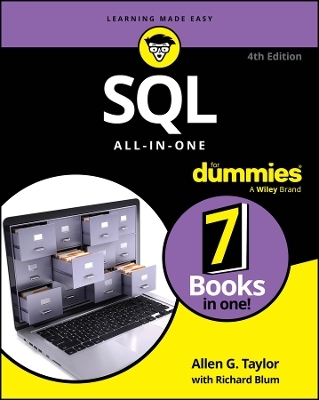
SQL All-in-One For Dummies
For Dummies (Verlag)
978-1-394-24229-0 (ISBN)
SQL All-in-One For Dummies has everything you need to get started with the SQL programming language, and then to level up your skill with advanced applications. This relational database coding language is one of the most used languages in professional software development. And, as it becomes ever more important to take control of data, there’s no end in sight to the need for SQL know-how. You can take your career to the next level with this guide to creating databases, accessing and editing data, protecting data from corruption, and integrating SQL with other languages in a programming environment. Become a SQL guru and turn the page on the next chapter of your coding career.
Get 7 mini-books in one, covering basic SQL, database development, and advanced SQL concepts
Read clear explanations of SQL code and learn to write complex queries
Discover how to apply SQL in real-world situations to gain control over large datasets
Enjoy a thorough reference to common tasks and issues in SQL development
This Dummies All-in-One guide is for all SQL users—from beginners to more experienced programmers. Find the info and the examples you need to reach the next stage in your SQL journey.
Allen G. Taylor is a 30-year veteran of the computer industry and the author of more than 40 books, including previous editions of SQL For Dummies and SQL All-in-One For Dummies. Richard Blum has more than 30 years of experience in the IT industry as a systems and network administrator. He is author of Linux All-in-One For Dummies 7th Edition, and PHP, MySQL, & JavaScript All-in-One For Dummies.
Introduction 1
Book 1: Getting Started with SQL 5
Chapter 1: Understanding Relational Databases 7
Chapter 2: Modeling a System 29
Chapter 3: Getting to Know SQL 53
Chapter 4: SQL and the Relational Model 65
Chapter 5: Knowing the Major Components of SQL 75
Chapter 6: Drilling Down to the SQL Nitty-Gritty 99
Book 2: Developing Relational Databases 133
Chapter 1: System Development Overview 135
Chapter 2: Building a Database Model 151
Chapter 3: Balancing Performance and Correctness 169
Chapter 4: Creating a Database with SQL 203
Book 3: Writing SQL Queries 217
Chapter 1: Values, Variables, Functions, and Expressions 219
Chapter 2: SELECT Statements and Modifying Clauses 249
Chapter 3: Querying Multiple Tables with Subqueries 295
Chapter 4: Querying Multiple Tables with Relational Operators 323
Chapter 5: Cursors 345
Book 4: Securing Your Data 357
Chapter 1: Protecting Against Hardware Failure and External Threats 359
Chapter 2: Protecting Against User Errors and Conflicts 391
Chapter 3: Assigning Access Privileges 419
Chapter 4: Error Handling 431
Book 5: Programming with SQL 447
Chapter 1: Database Development Environments 449
Chapter 2: Interfacing SQL to a Procedural Language 455
Chapter 3: Using SQL in an Application Program 461
Chapter 4: Designing a Sample Application 477
Chapter 5: Building an Application 497
Chapter 6: Understanding SQL’s Procedural Capabilities 513
Chapter 7: Connecting SQL to a Remote Database 531
Book 6: Working with Advanced Data Types in SQL: XML, JSON, and PGQ 545
Chapter 1: Using XML with SQL 547
Chapter 2: Storing XML Data in SQL Tables 575
Chapter 3: Retrieving Data from XML Documents 599
Chapter 4: Using JSON with SQL 617
Chapter 5: Exploring Property Graph Queries 633
Book 7: Optimizing Your Database 645
Chapter 1: Tuning the Database 647
Chapter 2: Tuning the Environment 659
Chapter 3: Finding and Eliminating Performance Bottlenecks 681
Book 8: Appendixes 709
Chapter 1: SQL:2023 Reserved Words 711
Chapter 2: Glossary 721
Index 731
| Erscheinungsdatum | 24.04.2024 |
|---|---|
| Sprache | englisch |
| Maße | 191 x 234 mm |
| Gewicht | 1089 g |
| Themenwelt | Mathematik / Informatik ► Informatik ► Datenbanken |
| Informatik ► Office Programme ► Outlook | |
| Mathematik / Informatik ► Informatik ► Programmiersprachen / -werkzeuge | |
| ISBN-10 | 1-394-24229-8 / 1394242298 |
| ISBN-13 | 978-1-394-24229-0 / 9781394242290 |
| Zustand | Neuware |
| Informationen gemäß Produktsicherheitsverordnung (GPSR) | |
| Haben Sie eine Frage zum Produkt? |
aus dem Bereich


